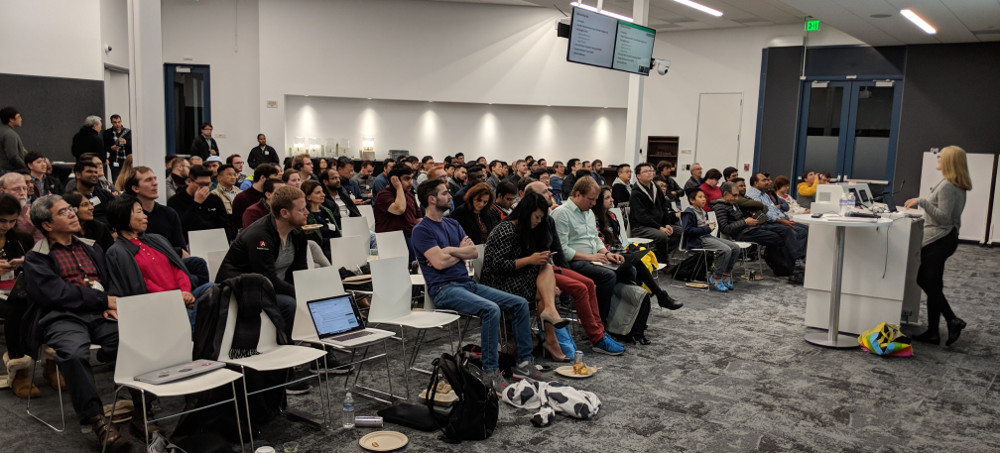Organizing a meetup can be challenging, but it can also be one of the most rewarding things that you can do. Building a community is one of the hardest things to master, but it's also one of the most valuable skills, and it's one part of the story of how I ended up at Google.
Now in my role on the Angular team, I get a chance to give back by helping community organizers and meetup leads with advice and suggestions.
Things to Know
Meetups happen at the intersection of 3 simple ideas:
- Attendees
- Hosts
- Speakers
The best speakers give presentations because they have a passion that they want to share. Attendees show up because of great content from speakers (among other benefits). Hosts often take the form of sponsors who want to increase their own staff's knowledge, increase their visibility in the community, or to find new employees and customers.
Start with great content and everything else will follow.
Top 7 Tips
Meetups can be of any size or shape, but there's a few things I've learned from running and working with meetup organizers. Here are my top 7 tips for running a successful meetup.
Meet on the same day every month
Pick a schedule and stick to it. Do you meet on the first Tuesday of the month? Great. By having a standardized schedule and reliable cadence that happens month after month, your attendees can become familiar with it, plan ahead. When you do this right, you'll make attending the default for your attendees, and take it out of the realm of a decision each time you schedule a meeting whether or not they can come.
Get to know your attendees
The best meetups are run by people who are as passionate as the rest of the attendees and who find speakers they would love to hear from.
Talk to your attendees, figure out what they are passionate about and share that passion. You'll most often find that your future co-organizers and speakers start as attendees at your meetup.
Don't be afraid to ask
No matter what topics you are exploring, you probably have a few people you admire or look up to. They might already be your favorite speakers or they might have some new perspective or ideas.
No matter who these people are, stop being afraid and ask them to join your group and share their knowledge! Depending on their calendar and profile, they will probably say no but they might say yes.
Don't forget to market
It can feel weird calling it marketing, but you need to get the word out about your meetups. You can do this via traditional social media, by emailing your colleagues or friends.
The world is full of information and requests and demands for people's time, and the only way your future attendees are going to figure out there's an awesome event happening that they want to attend is if you tell them.
You also shouldn't be afraid to talk to other meetups, as they may want to share related content with their attendees. Don't think of other meetups as competition, think of them as partners that have the same end goals as you and look for ways to cooperate. For technology meetups, there are often opportunities to partner with GDGs.
Finally, having an email list can actually be one of the best ways to get out the word about what's going on at your upcoming meetups, and in the community.
Take 2 minutes to connect recruiters to job seekers
For most meetups, there is a good mixture of personal and professional passion. When that's the case, it can be helpful to include recruiters in targeted ways.
I've seen a few meetups where at the beginning of the meetup they take a minute to ask "everyone who is looking for a job, raise your hand" followed by "everyone who is hiring, raise your hand". This small interaction doesn't take too much time away from the content, but can serve to create helpful introductions.
Recruiters provide a valuable service, but don't let them monopolize the meeting. They can often connect you to speakers, or even act as hosts, but make sure the content that the attendees are looking for is still the focus.
Reach out to GDEs
Google has a fantastic network of individuals certified in a number of different domains (such as the Angular GDEs). If you are looking for speakers, ask one of them! They are all talented and connected individuals who are often happy to help.
Join the meta-community
Now that you are a meetup organizer, did you know there are meetups just for meetup organizers? In the Angular universe, there are groups like ngCommunity led by Maxim Salnikov that share best practices like these, and can provide a community that understands the challenges and opportunities that face you.
--
Hopefully this list reminded you of a thing or two that might help improve your meetup, or make you more confident in taking on the challenge of becoming a community leader. As with many things in life, the hardest part is just deciding to do it, so get out there!




